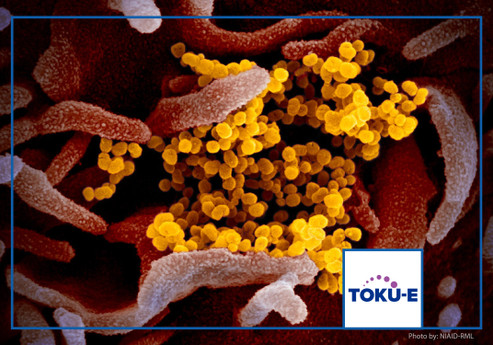The coronavirus disease 2019 (COVID-19) has spread rapidly into a global pandemic and research is underway to discover compounds that have activity against SARS-CoV2, that belongs to the β genus of Coronaviruses (α and β infect mammals while γ and δ infect birds).
Recent studies have shown that old compounds Chloroquine Phosphate (C142), Remdesivir (R050) and Niclosamide (N048, N051) have all shown promise in coronavirus research. Repurposing known compounds is a highly efficient way to leverage those with known safety profiles to fight the coronavirus outbreak.
Chloroquine Phosphate is a 70 year-old anti-malarial compound. According to a number of clinical trials in China, it can promote a virus-negative conversion and shorten the course of COVID-19. It has potential broad-spectrum antiviral activity by increasing endosomal pH. A low pH is required for the virus/cell fusion, and the compound is able to increase the endosomal pH which can prevent virus replication. It can also interfere with the glycosylation of cellular receptors of SARS-CoV. Its anti-inflammatory properties have been used for rheumatoid arthritis and lupus erythematosus and may contribute to its activity against the disease.
Remdesivir, a broad-spectrum, direct-acting antiviral, was developed by Gilead Sciences in 2009 as part of its R&D program for Hepatitis C, but it did not work as hoped. It was then repurposed and studied as a potential for Ebola virus and Marburg virus. Subsequently, it was discovered that it had in vitro activity against coronaviruses (coV) including severe acute respiratory syndrome CoV (SARS-CoV) and Middle East respiratory syndrome (MERS-CoV), and has recently found new potential against the new SARS-CoV2. The target of the nucleotide analog Remdesivir is RNA-dependent RNA polymerase. It efficiently incorporates the active triphosphate form of Remdesivir into RNA. The incorporation of this form at position i caused termination of RNA synthesis at position i+3.
Niclosamide is an antihelminthic used to combat tapeworms, and can be used as a molluscicide in water treatment applications, with diverse antiviral mechanisms. Recently, it has shown in vitro activity against cells infected with the coronavirus SARS-CoV2. Researchers at the University of Texas are working on different delivery systems of Niclosamide to increase its efficacy. The team has increased its solubility, and is currently performing oral studies. It is thought that two potential mechanisms of Niclosamide against COVID-19: 1) prevention of viral entry by altering endosomal pH; 2) prevention of viral replication by inhibition of autophagy. Clinical studies will be needed in order to evaluate in vivo activity.
If your research team is involved in repurposing existing compounds for activity against Coronavirus, we offer a diverse array of antivirals and antiparasitic compounds that could be useful in your research projects. Please visit our COVID-19 research page for more information.
References
Chloroquine Phosphate
Gao J, Tian Z, Yang X (2020) Breakthrough: Chloroquine phosphate has shown apparent efficacy in treatment of COVID-19 associated pneumonia in clinical studies. Biosci. Trends doi 10.5582. ePub PMID 32074550
Savarino A, Boelaert JR, Cassone A, Majori G and Cauda R (2003) Effects of Chloroquine on viral infections: An old drug against today's diseases? Lancet Infect. Dis. 3(11):722-727 PMID 14592603
Remdesivir
Agostini ML (2018) Coronavirus susceptibility to the antiviral Remdesivir (GS-5734) is mediated by the viral polymerase and the proofreading exoribonuclease. mBio 9 (2) e00221-18
Gordon CG (2020) Remdesivir is a direct-acting antiviral that inhibits RNA-dependent RNA polymerase from severe acute respiratory syndrome coronavirus 2 with high potency. J. Biol. Chem. doi 10.1074
Wang M et et al (2020) Remdesivir and chloroquine effectively inhibit the recently emerged novel coronavirus (2019-nCoV) in vitro. Cell Res. 30(3):269-271 PMID 32020029
Warren TK et al (2016) Therapeutic efficacy of the small molecule GS-5734 against Ebola virus in rhesus monkeys. Nature. 531(7594): 381–5
Niclosamide
New delivery method could make niclosamide an effective antiviral to treat Covid-19. University of Texas at Austin. Link to article.
Wu C et al (2004) Inhibition of severe acute respiratory syndrome coronavirus replication by Niclosamide. Antimicrob. Agents Chemother. 48(7): 2693-2696 PMID 15215127
Pindiprolu SKSS, Pindiprolu SH (2020) Plausible mechanisms of Niclosamide as an antiviral agent against COVID-19. Med. Hypoth. 140:109765

